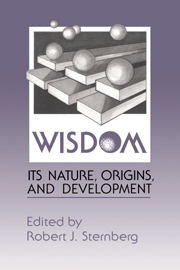Book contents
- Frontmatter
- Contents
- List of contributors
- Preface
- Part I Approaches to the study of wisdom
- Part II Approaches informed by philosophical conceptions of wisdom
- Part III Approaches informed by folk conceptions of wisdom
- 5 Toward a psychology of wisdom and its ontogenesis
- 6 Wisdom in a postapocalyptic age
- 7 Wisdom and its relations to intelligence and creativity
- 8 The study of wise persons: integrating a personality perspective
- Part IV Approaches informed by psychodevelopmental conceptions of wisdom
- Part V Integration of approaches and viewpoints
- Name index
- Subject index
5 - Toward a psychology of wisdom and its ontogenesis
Published online by Cambridge University Press: 05 June 2012
- Frontmatter
- Contents
- List of contributors
- Preface
- Part I Approaches to the study of wisdom
- Part II Approaches informed by philosophical conceptions of wisdom
- Part III Approaches informed by folk conceptions of wisdom
- 5 Toward a psychology of wisdom and its ontogenesis
- 6 Wisdom in a postapocalyptic age
- 7 Wisdom and its relations to intelligence and creativity
- 8 The study of wise persons: integrating a personality perspective
- Part IV Approaches informed by psychodevelopmental conceptions of wisdom
- Part V Integration of approaches and viewpoints
- Name index
- Subject index
Summary
The conceptual focus of our approach is to conceive of wisdom as an expert knowledge system (expertise). Specifically, we view wisdom as a highly developed body of factual and procedural knowledge and judgment dealing with what we call the “fundamental pragmatics of life.” The fundamental pragmatics of life concern important but uncertain matters of life. Specifically, they involve knowledge and judgment about the course, variations, conditions, conduct, and meaning of life. Before we describe this approach in more detail, we present some of the historical background and theoretical rationales that have stimulated us to pursue research and theory on the topic of wisdom.
Conceptual background
Our interest in the psychological study of wisdom is motivated by three general lines of psychological inquiry. A first is our interest in the study of high levels of human performance, the kind of performance that can be labeled as exceptional and expertlike (Baltes & Kliegl, 1986; Ericsson, in press; Kliegl & Baltes, 1987; Smith & Baltes, in press; Smith, Dixon, & Baltes, 1989). The second line of inquiry is our search for positive aspects of the aging mind (Baltes & Baltes, in press; Baltes & Labouvie, 1973; Baltes & Schaie, 1976). The third line of interest is work on conceptions of intelligence that reflect a concern with the contextual and pragmatic features of everyday functioning (Cornelius & Caspi, 1987; Denney, 1984; Dixon & Baltes, 1986; Rogoff & Lave, 1984; Sternberg & Wagner, 1986). These three general lines of inquiry are described in more detail in later sections of this chapter.
- Type
- Chapter
- Information
- WisdomIts Nature, Origins, and Development, pp. 87 - 120Publisher: Cambridge University PressPrint publication year: 1990
- 244
- Cited by

